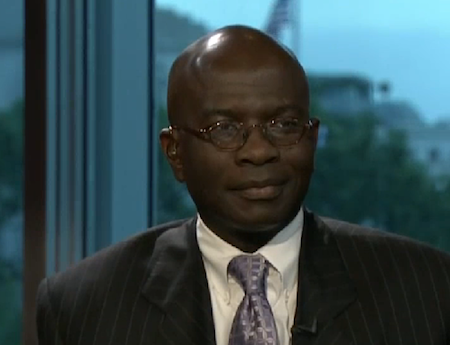Williams Filing JSA Waivers This Week

The smarter way to stay on top of broadcasting and cable industry. Sign up below
You are now subscribed
Your newsletter sign-up was successful
In an interview for C-SPAN's Communicators series, Armstrong Williams said he had instructed his lawyers this week to apply for waivers of the FCC's just-voted policy making joint sales agreements attributable as ownership interests. He said he is confident he will get them because he is active and involved in running the stations, something he could not afford to be doing without the JSAs.
Williams has JSAs with Sinclair for the two stations he owns in Flint, Mich., and Myrtle Beach, S.C.
Williams says Sinclair's big pockets were a blessing without which he could not have gotten access to the capital—through J.P. Morgan—to buy the stations, which he did as part of a spin-off deal of stations by Sinclair when it bought the Barrington group.
Williams said that when he tried to buy the stations independently, J.P. Morgan said "no way" unless they got "one of the big buys" to guarantee the loan.
Williams said that without Sinclair's backing, he would go belly up in a matter of months, though he later said if he did not get the waiver and had to unwind the JSAs he would find a way to reinvent himself that included owning the TV stations.
"Standalone cannot exist," he said, "that's why the Roberts Brothers in St. Louis had to go into bankruptcy, and why Granite couldn't make it. And it's not just minorities. It's people across the board. This is a game for the Sinclair’s, Belo's, and Gannett. They are the big boys and if you are not one of those, it is just very difficult as a standalone to compete for advertising dollars. Advertisers like to buy conglomerates. We're fortunate that Sinclair is able to go in and negotiate for us, including our retrans fees."
He said if he had to negotiate as a standalone, cable operators would just drop him from their systems. "It is important that we have someone with a proven track record in broadcasting and programming to be there for us and to fight for us."
The smarter way to stay on top of broadcasting and cable industry. Sign up below
He said he was very confident he would get the waiver. He conceded that in some cases staions are bought, gutted and left with nothing, leaving people frightened, but with Sinclair and his company, Howard Stirk Holdings, it is about being in the TV business for the long haul.
He suggested that without the backing of Sinclair sharing agreements, he could not afford the local programming, or news or to do things like replace a $400,000 generator destroyed by an ice storm, in addition to having to meet a $138,000 a month debt payment on his loans. "Without Sinclair I could not afford these figures," he said. "There is no way with my owning two or three television stations could I survive this without these joint agreements."
"Let's just to say we were to unwind [the sharing agreements] with my stations that exist now, in four months I would go belly up. And not just me. I'm speaking for all small town broadcasters that are in the same predicament I'm in."
He suggested he was not alone, and that other smaller operators needed similar big pockets to be able to both operate their stations and invest in improving them.
Williams said all sidecar deals are not created equal. He said he has total control over programming and gets 85% of the station's revenues.
Contributing editor John Eggerton has been an editor and/or writer on media regulation, legislation and policy for over four decades, including covering the FCC, FTC, Congress, the major media trade associations, and the federal courts. In addition to Multichannel News and Broadcasting + Cable, his work has appeared in Radio World, TV Technology, TV Fax, This Week in Consumer Electronics, Variety and the Encyclopedia Britannica.

